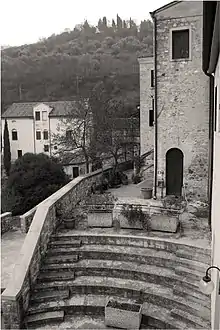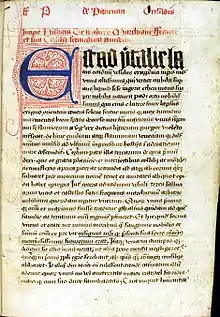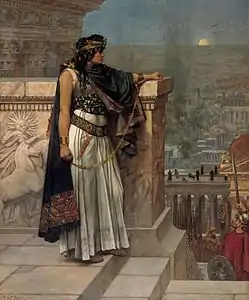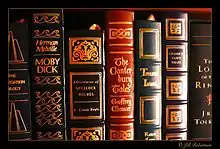
Contact between Geoffrey Chaucer and the Italian humanists Petrarch or Boccaccio has been proposed by scholars for centuries.[1] More recent scholarship tends to discount these earlier speculations because of lack of evidence. As Leonard Koff remarks, the story of their meeting is "a 'tydying' worthy of Chaucer himself".[2][3][4][5][6]
Chaucer's trips to mainland Europe

There are government records that show Chaucer was absent from England visiting Genoa and Florence from December 1372 until the middle of 1373.[5][7] He went with Sir James de Provan and John de Mari, eminent merchants hired by the king, and some soldiers and servants.[7][8] During this Italian business trip for the king to arrange for a settlement of Genoese merchants these scholars say it is likely that sometime in 1373 Chaucer made contact with Petrarch or Boccaccio.[5][9][10][11][12][13][14]
Milan 1368: The wedding of the Duke of Clarence and Violante Visconti
They believe it plausible that Chaucer not only met Petrarch at this wedding but also Boccaccio.[7][11] This view today, however, is far from universally accepted. William T. Rossiter, in his 2010 book on Chaucer and Petrarch argues that the key evidence supporting a visit to the continent in this year is a warrant permitting Chaucer to pass at Dover, dated 17 July. No destination is given, but even if this does represent a trip to Milan, he would have missed not only the wedding, but also Petrarch, who had returned to Pavia on 3 July.[15][16][17][18][19][20][21][22][23][24][25][26]
Canterbury Tales
The Clerk's Tale


However, this does not mean necessarily that Chaucer himself met Petrarch.[28][29][30][31][32][33][34][35][36]
Other works
The Legend of Good Women
Chaucer followed the general plan of Boccaccio's work On Famous Women in The Legend of Good Women.[29][35][37][38][39][22][40][41][42][43][44][45]
Alternative viewpoints

The Knight's Tale uses Boccaccio's Teseida and the Filostrato is the major source of Troilus and Creseyde.
References
- ↑ Thomas Warton, The history of English poetry, from the close of the eleventh to the commencement of the eighteenth century (first published London: J. Dodsley, etc.; Oxford: Fletcher, 1774–81) and William Hazlitt, Lectures on the English poets: delivered at the Surrey Institution (first published London: Taylor and Hessey, 1818): both extracted in Brewer 1995, pp. 226–30 (p.227) and 272–83 (p. 277)
- Hendrickson 1907, pp. 183–192
- Rearden 1882, p. 458
- Skeat 1900, pp. 382, 453, 454, 455
- Gardner 1999, p. 198
- Howard 1987, p. 190
- Gray 2003, p. 56
- Coulton 1908, p. 42 ...Speght writing in 1598...
- THE GEOFFREY CHAUCER PAGE – Giovanni Boccaccio (1313–1375)
- ↑ Koff 11
- ↑ anon, The World of Chaucer 2008
- Cousin 1910, p. 167
- Guiney 1908
- Boitani 1985
- Coulton 1908, p. 45
- ↑ Skeat 1910
- 1 2 3 Skeat 1900, p. 454 (Scholars being Professor Walter William Skeat and Dr. Furnivall)
- ↑ Coulton 1908, p. 40
- 1 2 3 Gray 2003, p. 251
- ↑ Howard 1987, p. 169
- ↑ Howard 1987, p. 191
- ↑ Crow, Martin M. et al, Chaucer Life-records.
- 1 2 Thomas Warton, The history of English poetry, from the close of the eleventh to the commencement of the eighteenth century (first published London: J. Dodsley, etc.; Oxford: Fletcher, 1774–81) extracted in Brewer 1995, pp. 226–30 (p.227))
- ↑ Howard 1987, p. 189
- ↑ Curry 1869, pp. 157, 158, 159
- ↑ Warton 1871, p. 296 (footnotes: Froissart was also present.)
- ↑ Rossiter 2010
- ↑ Meiklejohn 1887
- Coulton 1908, p. 41
- Coulton 1908, p. 44
- ↑ Skeat 1906
- ↑ Ames 1900, p. 98
- ↑ Skeat 1900, pp. 382, 453, 454, 455
- ↑ Skeat 1894, pp. 454–456
- ↑ Skeat (1900), p. xvii
- 1 2 Borghesi 1903, p. 20
- ↑ Boccaccio's Decameron
- ↑ Florence Nightengale Jones (1910). Boccaccio and his imitators in German, English, French, Spanish, and Italian literature, The Decameron. The University of Chicago Press – via Internet Archive.
- ↑ Warton 1871, p. 349
- ↑ anon, American Society for the Extension of University Teaching 1898, p. 82
- ↑ Skeat (1906), p. 182
- ↑ Boitani, p. 291
- 1 2 The Chaucer Review, Vol. 24, No. 2, pp. 163–165 (Fall, 1989), p. 164; Penn State University Press
- ↑ Liukkonen, Petri. "Petrarch". Books and Writers (kirjasto.sci.fi). Finland: Kuusankoski Public Library. Archived from the original on 12 March 2010.
- ↑ Boccaccio
- ↑ Wallace, Chaucerian Polity (Bishop)
- ↑ The Monk's Tale – Middle English
- ↑ The Monk's Tale – Modern English
- 1 2 Howard 1987, p. 195
- ↑ Gray 2003, p. 375
- ↑ Skeat (1900), p. xxviii
- ↑ Gray 2003, p. 58
- ↑ Skeat (1900), p. xxix
- ↑ "Boccaccio and Chaucer" by Peter Borghesi, Bologna, 1912
- ↑ Howard 1987, p. 187
- ↑ Gray 2003, p. 57
- ↑ Ames 1900, p. 99
- ↑ Gray 2003, p. 376
- ↑ Howard 1987, p. 282
Sources
- Ames, Percy Willoughby (1900). Chaucer memorial lectures. Asher and Co., London. Retrieved 14 November 2010.
- American Society for the Extension of University Teaching, The Citizen, Volume 3, American Society for the Extension of University Teaching, 1898, University of Michigan
- Bell, G. & Sons, 1912, The age of Chaucer (1346–1400), p. 152, Indiana University
- Boitani, Piero (1985). Chaucer and the Italian Trecento. CUP Archive. ISBN 0-521-31350-3. Retrieved 5 March 2010.
- Borghesi, Peter (1903). Boccaccio and Chaucer. Princeton University: N. Zanichelli. Retrieved 1 March 2010.
Borghesi, Peter, Boccaccio and Chaucer, N. Zanichelli, 1903,.
- Brown, Peter, A companion to Chaucer, pp. 454–456, Wiley-Blackwell, 2002, ISBN 0-631-23590-6
- Brewer, Derek, ed. (1995). Geoffrey Chaucer: The Critical Heritage: 1385–1837. Routledge. ISBN 0-415-13398-X. Retrieved 1 March 2010.
- Chambers, Robert, Cyclopaedia of English literature: a selection of the choicest productions of English authors from the earliest to the present time, World Publishing House, 1875, from HUP
- Chaucer, Geoffrey, The works of Geoffrey Chaucer, Publisher Macmillan, 1898, Harvard University
- Chaucer, Geoffrey (2001). "The Canterbury Tales and Other Poems". The Project Gutenberg. Archived from the original on 16 March 2011. Retrieved 1 March 2010.
- Cook, Albert Stanburrough (1916). "The Last Months of Chaucer's Earliest Patron". Transactions of the Connecticut Academy of Arts and Sciences. 21: 1–144. Retrieved 1 March 2010.
- Coulton, George Gordon (1908). Chaucer and his England. Methuen, London. at Internet Archive
- Coulton, George Gordon (1965). Chaucer and his England. Routledge. ISBN 0-416-67970-6. Retrieved 4 March 2010.
- Cousin, John W. (1910). A short biographical dictionary of English literature. Plain Label Books. ISBN 1-60303-696-2. Retrieved 1 March 2010.
- Crow, Martin M. et al., Chaucer Life-records, Clarendon Press, 1966. It includes materials such as receipts for his travels in Italy, copies of commissions, etc.
- Curry, William (1869). The Dublin University magazine, Volume 74. Princeton University: William Curry, Jun., and Co. Retrieved 1 March 2010.
- Dempster, Germaine (1943). "Chaucer's manuscript of Petrarch's version of the Griselda story". Modern Philology. University of Chicago Press. 41 (1): 6–16. doi:10.1086/388598. JSTOR 433948. S2CID 162034900.
- Edmunds, Edward William, Chaucer & his poetry, Volume 26 of Poetry & life series, p. 50, C.G. Harrap & Company, 1914
- Farrell, Thomas J. (2003). "Source or Hard Analogue? Decameron X, 10 and the Clerk's Tale". The Chaucer Review. 37 (4): 346–364. doi:10.1353/cr.2003.0011. Retrieved 1 March 2010.
- Finlayson, John (2000). "Petrarch, Boccaccio, and Chaucer's Clerk's Tale". Studies in Philology. xcvii (3): 255–275. JSTOR 4174672.
- Gardner, John (1999). Life and Times of Chaucer. Princeton University: Barnes & Noble Publishing. p. 321. ISBN 0-394-49317-6. Retrieved 5 March 2010.
Chaucer met Petrarch.
- Garnett, Richard, English literature : an illustrated record, Heinemann, 1906, from University of Michigan
- Ginsberg, Warren (2001). "Chaucer's Italian Tradition" (PDF). University of Michigan Press. Retrieved 1 March 2010.
- Gosse, Edmund, English literature : an illustrated record, p. 137, Heinemann, 1906. University of Michigan
- Guiney, Louise Imogen (1908). "Geoffrey Chaucer". New Advent. Retrieved 1 March 2010.
- Gray, Douglas (2003). The Oxford Companion – Chaucer. Oxford University: Oxford University Press. ISBN 0-19-811765-5.
- Hales, John Wesley (1887). "Chaucer, Geoffrey". In Stephen, Leslie (ed.). Dictionary of National Biography. Vol. 10. London: Smith, Elder & Co.
- Hammond, Eleanor Prescott, Chaucer: a bibliographical manual, p. 306, The Macmillan Company, 1908
- Hendrickson, G.L. (1907). Modern philology, Volume 4, complete detailed analysis as to Chaucer coming in contact with Petrarch and Boccaccio. Harvard University: University of Chicago Press. Retrieved 1 March 2010.
- Howard, Donald R. (1987). Chaucer, his life, his works, his world. E. P. Dutton. ISBN 0-525-24400-X. Retrieved 12 March 2010.
Dutton Donald Howard Chaucer 1987 His-life his-world His works.
- Hunt, Leigh, Leigh Hunt's London journal, Volumes 1–2, C. Knight, 1834
- Hutton, Edward, Giovanni Boccaccio: a biographical study, J. Lane, 1910, University of California
- James Clarke & Co., The literary world, Volume 21, 1880, p. 251, Princeton University
- Jenks, Tudor, In the days of Chaucer, p. 144, A. S. Barnes & company, 1904, Harvard University
- Johns Hopkins University, Modern language notes, Volume 12 No. 1, Johns Hopkins Press, 1897
- Jusserand, J.J., The Twentieth century, Volume 39, The Nineteenth Century and After, 1896, pp. 993–1005, detailed analysis of Chaucer coming in contact with Petrarch in 1373. UOM
- Koff, Leonard Michael. "Introduction". The Decameron and the Canterbury Tales: New Essays on an Old Question. Madison: Fairleigh Dickinson University Press, 2000.
- Langer, William Leonard, An encyclopaedia of world history, ancient, medieval and modern ..., Volume 1, p. 267, Houghton Mifflin Co., 1948
- Meiklejohn, John Miller Dow (1887). "English Language and Literature – Geoffrey Chaucer". A Brief History of the English Language and Literature, Volume 2. The Project Gutenberg EBook / D. C. Heath & Co. Retrieved 1 March 2010.
- Rossiter, William T. (2010). Chaucer and Petrarch. Chaucer studies. Cambridge: D.S. Brewer. p. 38. ISBN 978-1-84384-215-6. Retrieved 16 November 2010.
- Rutherford, Mildred Lewis, French authors: a hand-book of French literature , p. 39, The Franklin Printing and Publishing Company, 1906, Princeton University
- Schibanoff, Susan, Chaucer's queer poetics: rereading the dream trio, p. 316, University of Toronto Press, 2006, ISBN 0-8020-9035-4
- Skeat, Walter William (1894). The Complete Works of Geoffrey Chaucer (vol 3): The house of fame:The legend of good women: The treatise on the Astrolabe: Canterbury tales text. Clarendon press. Retrieved 12 March 2010.
House of Fame Chaucer Petrarch.
- Skeat, Walter William (1900). The Complete Works of Geoffrey Chaucer (vol 3–4): The house of fame:The legend of good women: The treatise on the Astrolabe: Canterbury tales text. Clarendon press. Retrieved 17 November 2010.
- Skeat, Walter William (1906). The prioresses tale, Sire Thopas, the Monkes tale: the Clerkes tale ... from the Canterbury tales. Clarendon Press. Retrieved 1 March 2010.
- Rev. Prof. Skeat, M.A. with Portrait of Chaucer. 4 vols (1910). "Books on Chaucer". Bohris Standard Library. Retrieved 1 March 2010 – via Internet Archive.
{{cite web}}: CS1 maint: numeric names: authors list (link) - Stearns, Peter N. The Encyclopedia of world history: ancient, medieval, and modern, p. 240, Houghton Mifflin Harcourt, 2001, ISBN 0-395-65237-5
- Rearden, T.H. (1882). The Californian, Volume 5. University of California. Retrieved 1 March 2010.
- Tatlock, John Strong Perry, The development and chronology of Chaucer's works, Pub. for the Chaucer society, by K. Paul, Trench, Trübner & co., limited, 1907
- Tyrwhitt, Thomas (1860). "Canterbury tales. To which are added an essay on his language and versification, and an introductory discourse, together with notes and a glossary". London: James Nisbet & Co. Retrieved 1 March 2010 – via Internet Archive.
- Wallace, David, Giovanni Boccaccio, Decameron, pp. 48, 110–112, Cambridge University Press, 1991, ISBN 0-521-38851-1
- Ward, Sir Adolphus William, Chaucer, pp. 73–74, MacMillan and Company limited, 1907, University of California
- Warton, Thomas (1871). The history of English poetry, from the close of the eleventh to the commencement of the eighteenth century, Volume II. Princeton University: Reeves and Turner.
- White, William, Notes and queries, Volume 96, p. 284, Oxford University Press, 1897
- anon (1898). "American Society for the Extension of University Teaching". The Citizen. 3. Retrieved 1 March 2010.
- anon (December 2004). "Echoes of Boethius and Dante in Chaucer's Troilus and Criseyde". Medieval and Early Modern English Studies. 12 (2). Retrieved 1 March 2010.
- anon (1897). Modern language notes, Volume 12 No. 1 – Detailed analysis of Chaucer contact with Petrarch. Johns Hopkins Press: Johns Hopkins University.
- anon (2008). "The World of Chaucer – Medieval Books and Manuscripts: Influences". Glasgow: Special Collections Department, Library, University of Glasgow. Retrieved 1 March 2010.
_-_Petrarch's_house_at_Arqu%C3%A0_-_da_-_Roscoe%252C_Thomas%252C_The_tourist_in_Switzerland_and_Italy_1831.jpg.webp)
.jpg.webp)